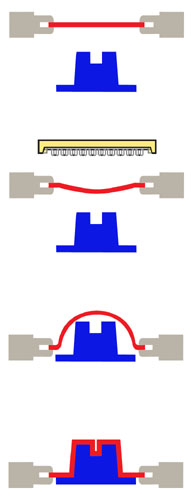![]()
 |
Vacuum forming, also known as thermoforming, enables complex plastic shapes to be cost-effectively and accurately produced. It is ideal for a whole host of housing solutions such as boxes and enclosures or intricate detail within custom made component handling trays for example. The stages of the process are illustrated left. In operation, a plastic sheet is clamped in the vacuum forming press and pre-heated. A short blast of air is then directed underneath the sheet to initially stretch the sheet before it is subsequently drawn down under vacuum on to the mould. The simplicity of vacuum forming has many major advantages including significantly lower cost tooling compared to injection moulding and notably, complex shapes do not necessarily mean a more expensive end product. Vacuum Forming is ideal for prototypes and inexpensively tooled prototypes can usually be produced within a few days, enabling your design team to quickly and efficiently evaluate the component and test materials. Any alterations or modifications are easily accommodated, ensuring the design is perfectly suited to your needs before committing to final production tooling. The moulding process is extremely flexible and enables intricate features to be easily integrated that otherwise would be difficult and thus expensive by alternative fabrication methods. Once tooled, these features can be reproduced accurately time after time after time. If you have a component that is cost sensitive and could be vacuum formed, call Perancea now, we may be able to break the traditional mould. |